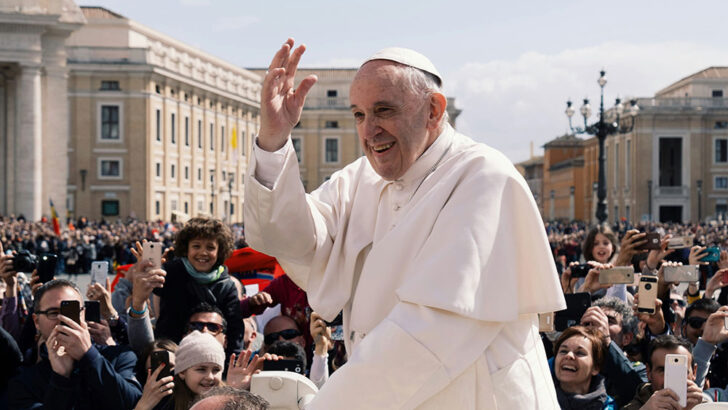For many, religion can be inspirational and enhancing, bringing out the best in people as they try to live in a harmonious relationship with God, each other and nature. But it can turn sour if infected by extremism, and that draws the media like a magnet.
Cults are a particularly ugly manifestation of this, a theme explored in Waco Untold: The British Stories (Virgin Media 1, Thursday). The stories of David Koresh, the Branch Davidians and the Waco siege of 1993 were familiar enough, but I hadn’t previously realised how may British people were involved. Koresh had recruited intensively in the UK among Seventh Day Adventists, and several recruits headed off to what became the increasingly repressive and abusive compound in Waco, Texas. It was disturbing to see idealistic young people, even theology students, hoodwinked by the charismatic leader – a common story when it comes to cults. It just shows how charisma in leadership can be deadly if it goes off the rails. It was heartbreaking to hear, years later, from the relatives of those who went to Waco – at that time trying to make contact with their relatives who were increasingly cut off from home, worrying especially when news stories of the siege began to filter through to UK media.
Koresh’s familiarity with the Bible and his ability to link themes across several parts of it was part of what enhanced his appeal, but it wasn’t clear whether he was a deluded fantasist or a cynical manipulator, probably an unhealthy combination of both. A local sheriff found him to be a ‘creep’ and a ‘punk’ and thought there must be something lacking in the people who were drawn to the cult – all the more awful as Koresh was using their vulnerabilities against them. I thought there was value in revisiting the story – as a warning to people not to be taken in by gurus or scammers, especially those who use religion as bait, even if initially they seem well motivated.
Liveline (RTÉ Radio 1) frequently unveils scams or other dodgy practices in commercial or religious circles. However last week presenter Joe Duffy tuned his attention to the controversial remarks of Pope Francis about homosexuals in seminaries. An off-the-cuff remark, regarded as a homophobic slur, was leaked to the media and caused quite a stir. Predictably, among those invited to speak on air was Bernard Lynch, a dissident American priest living in an openly gay relationship (described as a ‘great campaigner’ by the presenter). On Wednesday he used slurs against previous Popes (‘homophobic absolutes’) and made sweeping claims about the clergy and homosexuality but wasn’t asked for evidence. Yet, when the Trump storm kicked off again last week, RTÉ News re-introduced the tagging of his claims as being ‘without evidence’. This only works if applied consistently, which it’s not. It was a common device when Trump lost the election in 2020, but curiously the phrase was used across several media outlets at the time. I wonder how that happened and who was pulling those particular strings.
To be sure, some of Trump’s angry claims in his post-trial press conference were outlandish and offensive, especially where it concerned migrants coming to the USA from jails and insane asylums. Particularly bizarre was his statement that one of his witnesses was ’literally crucified’ in court. Wow!
Finally, it was good to see Sunday Morning Live (BBC One) returning last weekend for a new series. The lifestyle stuff can be fluffy (there was an item last Sunday about the spiritual side of bubbles!) but they do get into serious issues and make sure to have a genuine diversity of views. The main debate this time was the role of young people in society and in particular whether voting should be extended to 16-year-olds – a debate coming our way soon. The debate was set in the context of recent moves in the UK to bring in some form of national service for young people – that seems a poorly thought-out election gimmick, whatever the merits of the actual proposal.
The second serious discussion, and not unrelated to the first, was about high levels of loneliness in young people and the proposal for ‘social prescribing’ – assigning worthwhile activities as a remedy. There wasn’t much disagreement, but some felt this was too much medicalising and labelling.
I’m inclined to think that labelling the ailment rather than the child would be a forward step.
PICK OF THE WEEK
SUNDAY SEQUENCE
BBC Radio Ulster Sunday June 9, 8.30pm
Topical religious and ethical issues with a Northern Ireland flavour.
SONGS OF PRAISE
BBC One Sunday June 9, 1.15pm
Ahead of Carers Week, the Rev. Kate Bottley is in Norfolk, exploring the important role faith plays for those caring for loved ones.
1531 – A STORY THAT IS NOT FINISHED YET
EWTN Sunday June 9, 9pm
Film about the apparitions of Our Lady of Guadalupe as told through the actual testimonies of St Juan Diego, Bishop Zumárraga and the people who witnessed the miraculous image.


 Brendan O’Regan
Brendan O’Regan
